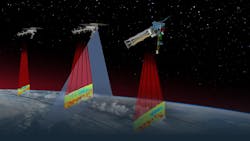NASA selects Blue Canyon Technologies to provide microsatellites for INCUS mission
LAFAYETTE, Colo., - Small satellite manufacturer and mission services provider Blue Canyon Technologies, a Raytheon Technologies subsidiary based in Lafayette, Colo. has been selected by the National Aeronautics and Space Administration's (NASAs) Jet Propulsion Laboratory to design and manufacture three microsatellites to support NASA's Investigation of Convective Updrafts, or INCUS, mission.
The INCUS mission – led by Colorado State University and managed by NASA's Jet Propulsion Laboratory – aims to better understand the complex dynamics of thunderstorms and their impact on Earth's climate and weather models.
Blue Canyon's microsats will fly in tandem coordination, each displaying a dynamic atmospheric radar and dynamic microwave radiometer measuring the atmospheric conditions of Earth.
"BCT's successful science exploration programs and our experience controlling large flexible structures will be key to supporting this critical science mission," said Jeff Schrader, president of Blue Canyon Technologies.
Storms begin with rapidly rising water vapor and air that create towering clouds primed to produce rain, hail, and lighting. The greater the mass of water vapor and air that is transported upward in the atmosphere, the higher the risk of extreme weather. This vertical transport of air and water vapor, known as convective mass flux (CMF), remains one of the great unknowns in weather and climate. Systematic CMF measurements over the full range of conditions would improve the representation of storm intensity and constrain high cloud feedbacks – which can add uncertainty – in weather and climate models.
Blue Canyon's work will be performed at its Crescent Constellation Factory located in Lafayette, Colorado.
